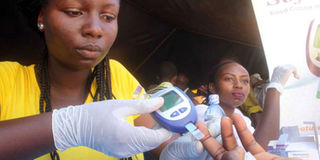Lobby seeks more funds to address lifestyle diseases crisis

A health worker draws a blood sample from a resident to test for diabetes during a free medical camp at Kabiruini Catholic Church, Nyeri County, on February 25, 2018. Health activists have complained of poor funding in tackling the diabetes issue. PHOTO | JOSEPH KANYI | NATION MEDIA GROUP
What you need to know:
- Dr Kibachio said the government is committed to expanding the level of awareness of NCDs.
Insufficient funding is hampering Kenya’s efforts to reduce the non-communicable disease (NCD) burden, a lobby says.
Kenya Non-Communicable Disease Alliance chairperson Eva Njenga said the government had overlooked the budgetary needs of NCD patients’ care, fuelling the morbidity and mortality associated with the diseases.
She said insufficient funding had fuelled the NCD crisis in the country as the diseases now account for more than 50 per cent of hospital admissions.
“Currently, the country’s budget for NCDs is only pegged at less than one per cent of the curative health budget, as compared to malaria, HIV-Aids and maternal child health, which take up the lion’s share at 90 per cent,” Dr Njenga observed.
TREATMENT
She said the current contributions towards the National Hospital Insurance Fund would not be enough to cover patients with NCDs who require expensive medication, and called on the government to source for alternative sources of financing.
“At current contribution levels, we are not able to sustain our patient care expenses. It is, therefore, necessary to think further and find additional sources of health financing for chronic disease patients,” Dr Njenga said.
Ms Kate Ndwiga, a 38-year-old visually impaired woman who was diagnosed with diabetes at the age of four, appealed to the government through NHIF to scale up the coverage of chronic diseases, saying most NCDs were insufficiently funded by the State insurer.
“We would like to see the NHIF providing comprehensive healthcare packages for NCD patients like insulin for diabetes patients, all related tests and lab fees as well as medication in addition to the dialysis it pays for.
"This will reduce the financial pressure on us,” she said at a conference on NCDs.
DONORS
African Medical and Research Foundation chief executive Githinji Gitahi asked policymakers to stop making budgets and drawing up programmes based on expected donor funding, saying the time to finance healthcare had arrived.
“We need to stop depending on donor funding to finance our healthcare programmes,” he said.
Dr Gitahi called on Kenyans to urgently acquaint themselves with the budget process at county levels in order to push the devolved units into boosting their healthcare spending plans.
AWARENESS
Head of the NCDs in the Ministry of Health, Dr Joseph Kibachio, said the government is committed to expanding the level of awareness of NCDs among local communities through public education and engagement with patients to understand their concerns and address their needs accordingly.
“We are scaling up our outreach effort to ensure that those with NCDs are not only well taken care of, but are also active participants in the disease management agenda,” he said.





